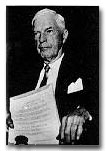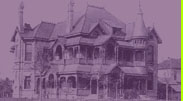GREAT CITIZENS - WILL CLAYTON
 Will Clayton, Anderson's partner, often referred to as "Mr. Cotton," was born on February 7, 1880 in Tupelo, Mississippi to James Monroe Clayton and his wife. After his cotton farm failed in 1886, Clayton's father moved to Jackson, Tennessee where Clayton became acquainted with the Anderson family.
Will Clayton, Anderson's partner, often referred to as "Mr. Cotton," was born on February 7, 1880 in Tupelo, Mississippi to James Monroe Clayton and his wife. After his cotton farm failed in 1886, Clayton's father moved to Jackson, Tennessee where Clayton became acquainted with the Anderson family.
Although Clayton attended public schools in Jackson, he quit at the age of thirteen after completing the seventh grade. By studying shorthand at night, he became a deputy clerk and public stenographer and, in 1895, secretary to Jerome Hill of the Cotton Ginners Compress Company of St. Louis, Missouri. Thus began his long and successful career in the cotton business.
The following year, Clayton moved with Mr. Hill to New York City as an employee of the American Cotton Company. While in New York, he studied French, economics, politics and geography and, in 1904, became an assistant general manager of the firm.
On August 1, 1904, Clayton and the Anderson brothers formed the cotton merchandising firm Anderson, Clayton and Company in Oklahoma City. Instrumental in the growth of the firm into an international corporation, Clayton later became known as "the greatest cotton merchant in the world." Eventually, Anderson, Clayton and Company maintained branch offices in such cotton-producing lands as Egypt and South America and boasted sales offices on five continents.
In 1940, Clayton took a leave of absence from the company and turned his attention to national affairs. Starting as an nonsalaried official in Governor Nelson Rockefeller's office for the coordination of inter-American affairs, Clayton later served as Deputy federal Loan Administrator, Assistant Secretary of Commerce and War Property Administrator before becoming Undersecretary of State for Economic Affairs in December 1943. His greatest achievement in government was the creation of the European Recovery Program, better known as the Marshall Plan.
Although Clayton left his post as Assistant Secretary of State in October 1947 and returned to Houston, to continue as chairman of the board of Anderson, Clayton and Company, he did remain active in international affairs. In 1948, he served as chairman of the United States delegation to the United Nations conference on trade and employment held in Havana, Cuba. A long-time advocate of unrestricted world trade as an antidote to communism, Clayton enthusiastically supported the establishment of the European Common Market and, as vice-chairman of the Atlantic Union Committee, promoted free economic exchange among all democracies.
After retiring as head of Anderson, Clayton and Company in 1950, Clayton became involved in a number of civic causes in Houston. He began to focus attention on slums and the concept of replacing them with low cost housing projects. In addition, Clayton supported a program promoting international student exchange. One of his last bequest was a $350,000 grant to the Johns Hopkins University School for Advanced International Studies in Washington, D.C. He died in Houston on February 8, 1966 at the age of 86.






